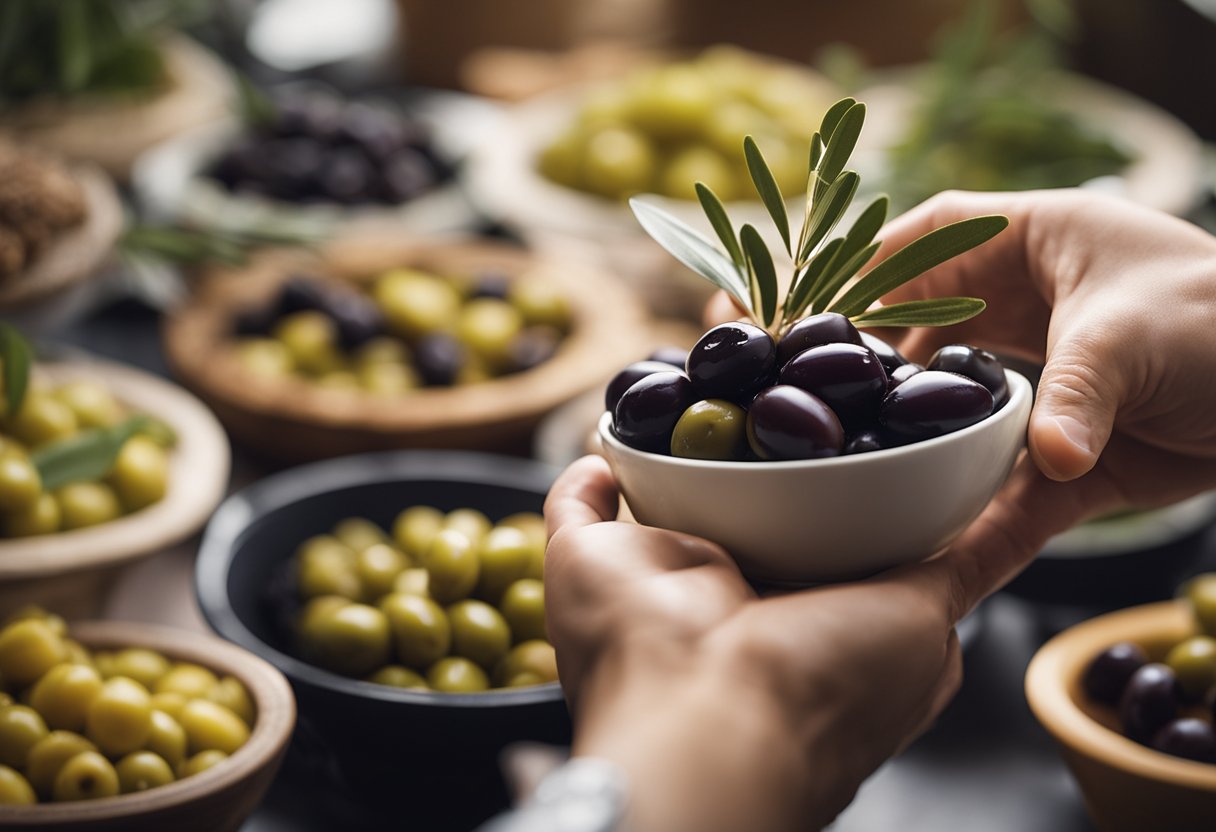
Discover new flavors and zest for your olives with these fail-safe marinating methods and tips to elevate their taste.
When you choose olives, your decision impacts not just flavor but also the nutritional benefits you’ll receive. Opting for the right variety can make all the difference.
Identifying Flavor Profiles of Popular Olives
Different olives come with distinct tastes, textures, and culinary uses. Kalamata olives are a standout with their rich, fruity flavor, while green olives offer a firmer texture and a more bitter punch. Here’s a quick breakdown to help you match your taste preferences with the right type:
- Kalamata Olives: Deep purple, almond-shaped, and meaty. Great in salads or as a snack.
- Green Olives: Round and firm. Perfect for martinis or on pizza.
| Olive Type | Flavor Profile | Perfect Pairing |
|---|---|---|
| Kalamata | Rich, fruity, slightly smoky | Greek salads |
| Green | Firm, slightly bitter | Cocktails, pizzas |
Olives and Nutrition
Your olive selection can also contribute to your daily nutritional intake. Olive types differ slightly in calories, fat content, potassium levels, and fiber, as well as in vitamin C, calcium, and iron. For instance, a serving of kalamata olives can boost your iron intake, which is essential for healthy blood cells. In contrast, green olives are a good source of vitamin E, supporting skin health.
Here’s a nutrition chart to compare:
| Nutrient | Kalamata Olives (per 100g) | Green Olives (per 100g) |
|---|---|---|
| Calories | 250 | 145 |
| Fat | 21g | 15g |
| Potassium | 8mg | 42mg |
| Fiber | 3.2g | 3.3g |
| Vitamin C | 0.9mg | 0.0mg |
| Calcium | 88mg | 52mg |
| Iron | 3.81mg | 0.49mg |
By understanding both the flavor and nutritional content, you can make savvy choices that cater to your palate and your health.
Essential Ingredients for Enhanced Flavor
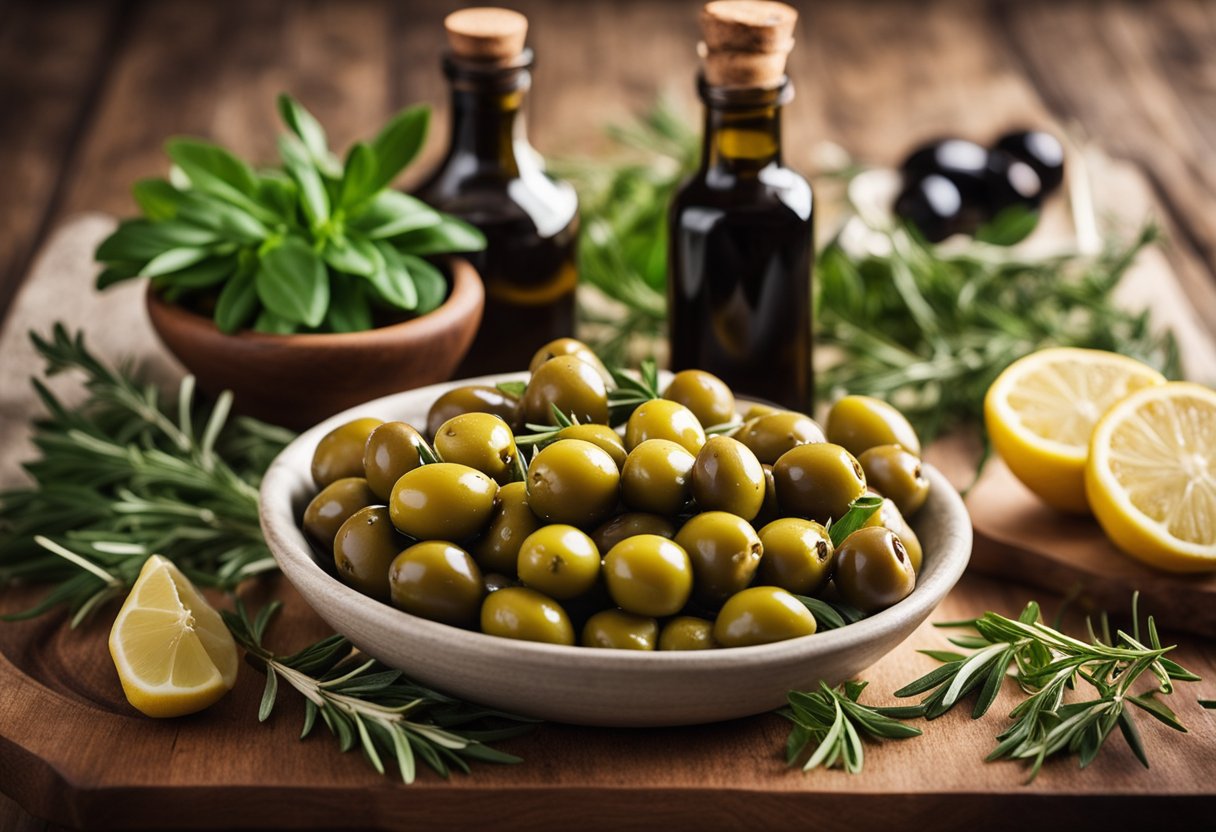
To truly elevate the taste of your olives, focusing on quality ingredients and the right flavor pairings is crucial. Let’s explore how to make your olives irresistibly tasty.
Choosing Complementary Herbs and Spices
For an aromatic kick, blend herbs and spices that complement the natural flavor profile of olives. Here’s a simple guideline for you to follow:
- Garlic: Adds a savory depth, perfect with robust black olives.
- Rosemary: A fragrant herb that infuses a piney aroma, enhancing green olives especially.
- Thyme: Its subtle, earthy notes work well with a variety of olives.
- Oregano: Lends a classic Italian herbaceousness, ideal for a Mediterranean twist.
- Lemon Zest: Brighten up your olives with citrus notes for a fresh spin.
- Fennel Seeds: These licorice-like seeds add a touch of sweetness and anise flavor.
- Bay Leaves: Provide a subtle, woodsy flavor that can bring complexity to your marinade.
- Peppercorns: Crack them for a spicy pop that excites the palate.
Quality of Olive Oil for Marinating
Choosing high-quality olive oil for a luxurious marinate is non-negotiable. Keep in mind:
- Extra-virgin olive oil is the purest form and offers a full-bodied flavor.
- Look for cold-pressed options, which mean minimal heat is involved, preserving the oil’s taste and nutrients.
- Ensure the olive oil’s freshness; a bitter taste indicates it may be past its prime.
- A good olive oil should smell like fresh olives and have a well-balanced flavor that will not overpower your chosen herbs and spices.
The Art of Curing and Marinating
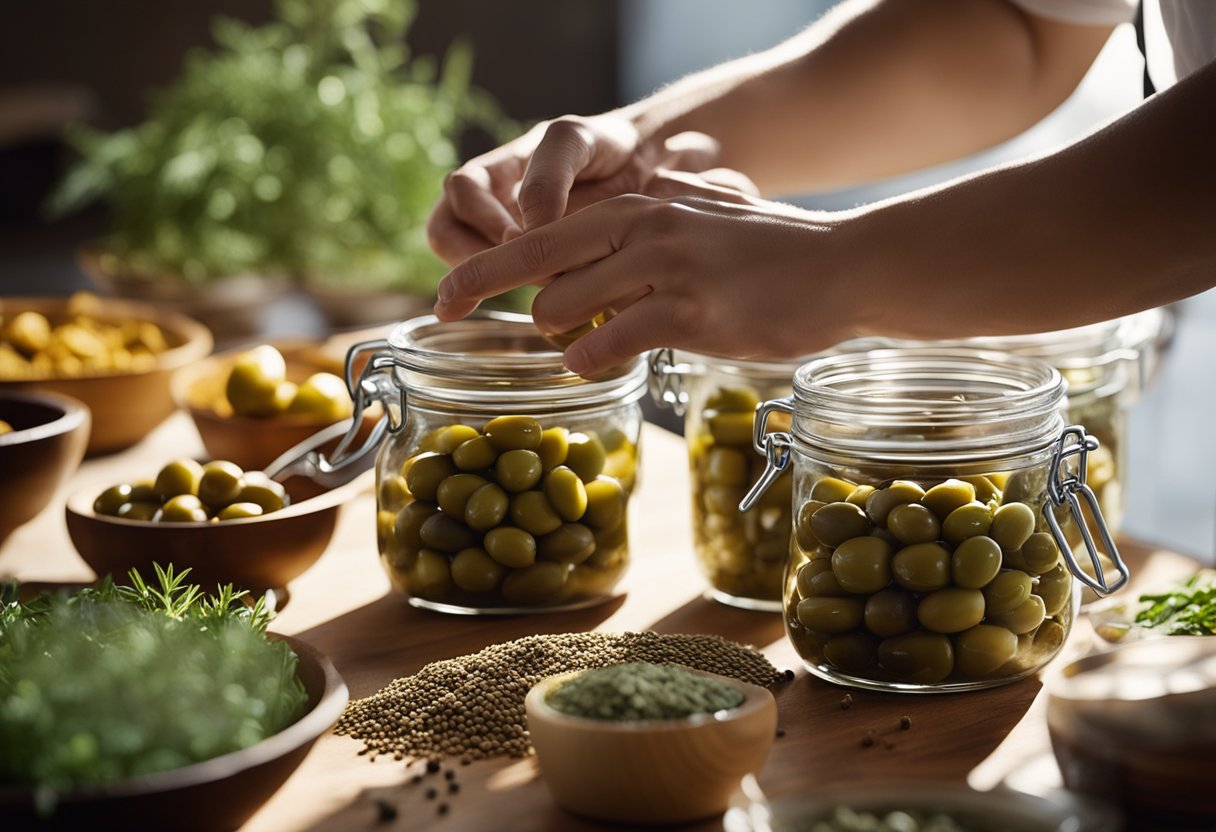
Enhancing olives’ flavor involves two key processes: curing to remove bitterness and marinating to infuse delightful flavors.
Curing Methods for Optimal Taste
You’ll find that curing is essential to transforming the bitter compounds in fresh olives into more palatable flavors. The main culprit for bitterness is a compound called oleuropein, which can be reduced using various curing methods with specific sodium levels to maintain the right pH balance. For instance, brine curing involves submerging olives in a mix of water, salt, and sometimes vinegar for several weeks, allowing a natural fermentation that diminishes the oleuropein and introduces tangy notes. To speed up the process, water curing and lye curing are alternatives, where frequent water changes or a short lye treatment can effectively lower the bitterness.
Expert Marinating Techniques
Once cured, it’s time to make your olives shine with a personalized marinade. Start by selecting a base for your marinade—olive oil, vinegar, or a combination of both works wonders. Incorporate lemon juice or other citrus elements for a bright pop of flavor, or add a dash of red pepper flakes for a spicy kick. Don’t hesitate to mix in a variety of fresh herbs, such as rosemary or thyme, to infuse your olives with aromatic notes. Remember, the longer your olives are marinated, the more intense and complex flavors they’ll develop.
Serving and Pairing Suggestions
Elevate your olive experience with the right food and drinks, serving them in a way that enhances their unique flavors. Let’s discover how to turn olives into the perfect appetizer or party highlight with these pairing and presentation tips.
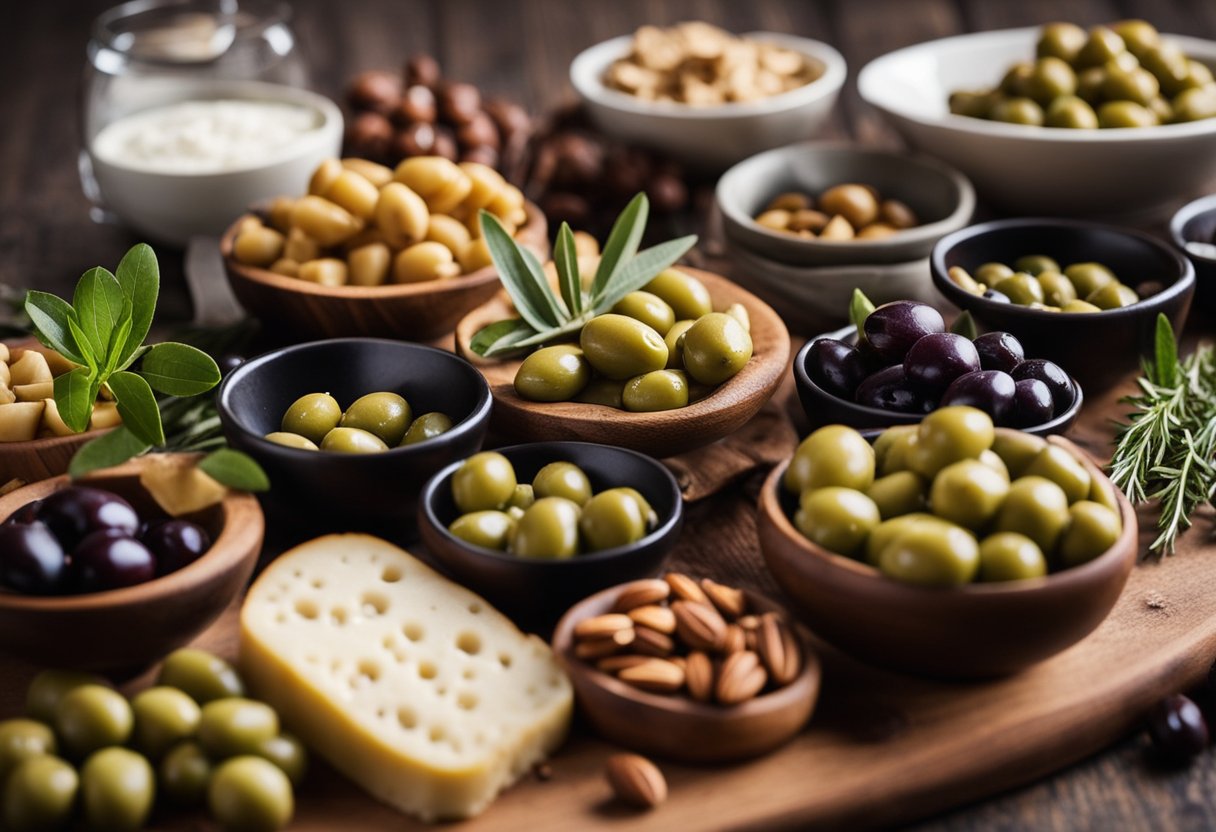
Ideal Pairings with Food and Drinks
- Wine: Select a crisp, dry white wine or a light-bodied red to accompany your olives. Think along the lines of Sauvignon Blanc or Pinot Noir that can complement the salty and briny flavors.
- Cheese: Olives work wonders with cheese. Pair them with a sharp blue cheese or creamy goat cheese for a flavor-packed bite.
- Appetizers: For a mouthwatering appetizer, try combining olives with hummus or tapenade on a crostini. These pairings will surely be a hit at any gathering.
Presentation and Serving Tips
- Serving Bowls: Place your olives in small, attractive bowls to make them easily accessible and add a touch of elegance to your spread.
- Accompaniments: Serve an array of olives with elegant cheese knives and small forks or toothpicks to allow for easy and hygienic sharing.
- Garnish: Garnish the olive plate with fresh herbs or citrus zest to enhance the flavor and bring a pop of color to your presentation.
Storing and Keeping Olives Fresh
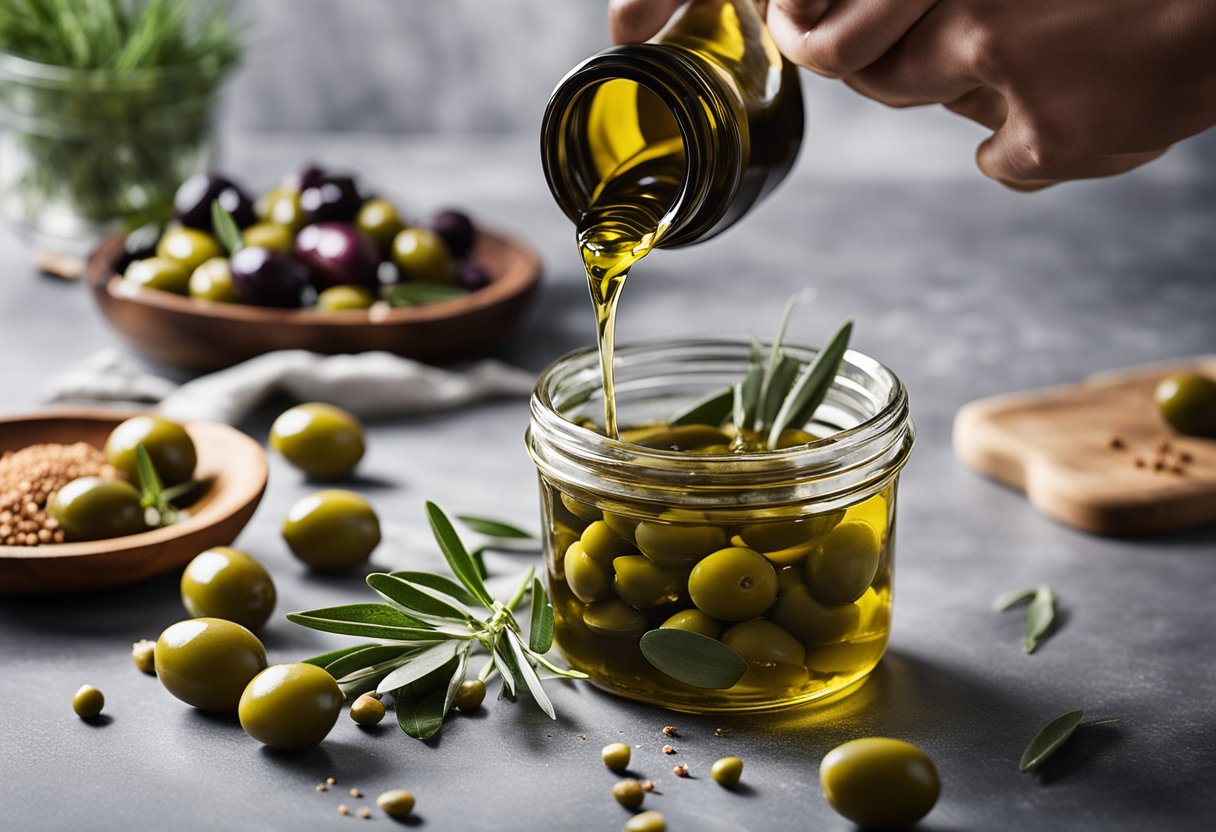
Storing olives properly is essential to maintaining their flavor and freshness. Through clever storage techniques, you can extend the life of your olives and keep them tasting great.
Proper Storage Techniques
Room Temperature Storage: Before opening, you can store your jars or cans of olives at room temperature in a cool, dark place. The ideal spot is away from direct sunlight and heat sources, which can degrade the quality of the olives. A pantry or cupboard often provides the perfect environment.
Refrigerator Storage: Once opened, transfer the olives to an airtight container if they’re not already in one. It’s best to ensure the olives are fully submerged in their own brine or in extra virgin olive oil to keep them moist and flavorful. Pop them into the refrigerator, where they can stay fresh for 1-2 weeks.
Olive Bar Freshness: If you’ve picked your favorites from an olive bar, they’ll likely come in a plastic container. Make sure to keep this container in the fridge and consume the olives within a few days to enjoy their best taste.
A Tip for Travel: When taking olives on the go, it’s a good move to pack them in a small, tightly-sealed jar or container with some of their brine or oil. This keeps them moist and preserves the taste until you’re ready to enjoy them.
Frequently Asked Questions
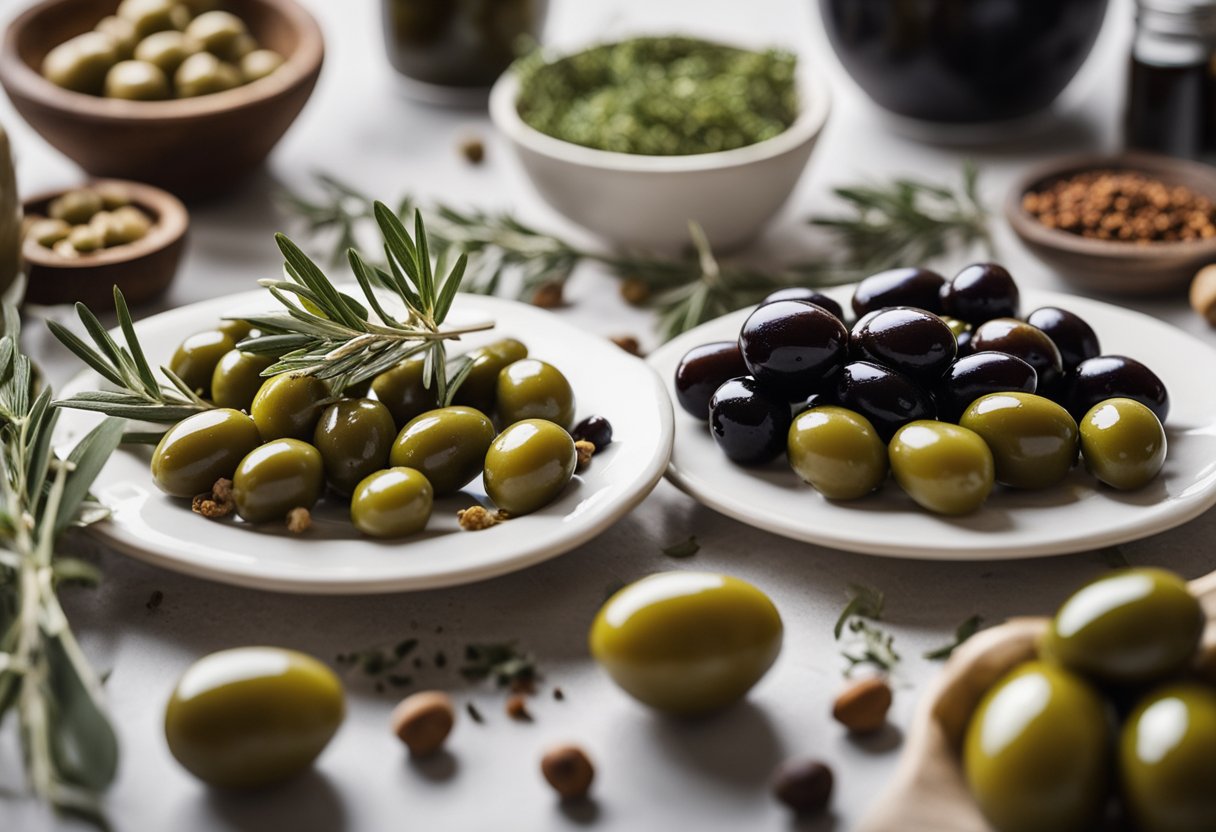
What are some quick and easy ways to marinate olives at home?
Start by tossing your olives in a mixture of olive oil, vinegar, and your choice of spices. Let them soak for at least an hour or overnight in the fridge for a deeper flavor fusion.
Can you recommend a recipe that uses lemon and herbs to marinate olives?
Absolutely! Mix fresh lemon zest and juice with olive oil, crushed garlic, rosemary, and thyme. Marinate your olives in this vibrant concoction for a refreshing, citrusy twist.
What is considered the best herb mix for homemade marinated olives?
Combine dried oregano, thyme, rosemary, and a touch of crushed red pepper to create a classic and aromatic herb blend that turns ordinary olives into a gourmet delight.
How can Spanish-style marinating improve the taste of olives?
Spanish marinating immerses olives in a flavorful bath of paprika, garlic, and sherry vinegar, infusing them with a smoky and slightly tangy flavor that’s simply irresistible.
What are some tips to reduce the bitterness in olives?
Blanching your olives before marinating or soaking them in water for a few days can help mellow out the bitterness, making them more palatable and ready to absorb the marinade’s flavors.
Are there any tricks to enhance the flavor of green olives?
Absolutely! Try crushing your green olives slightly before marinating to help them absorb more of the marinade. Adding a splash of citrus or a sprinkle of chili flakes can also give them an exciting flavor boost.
